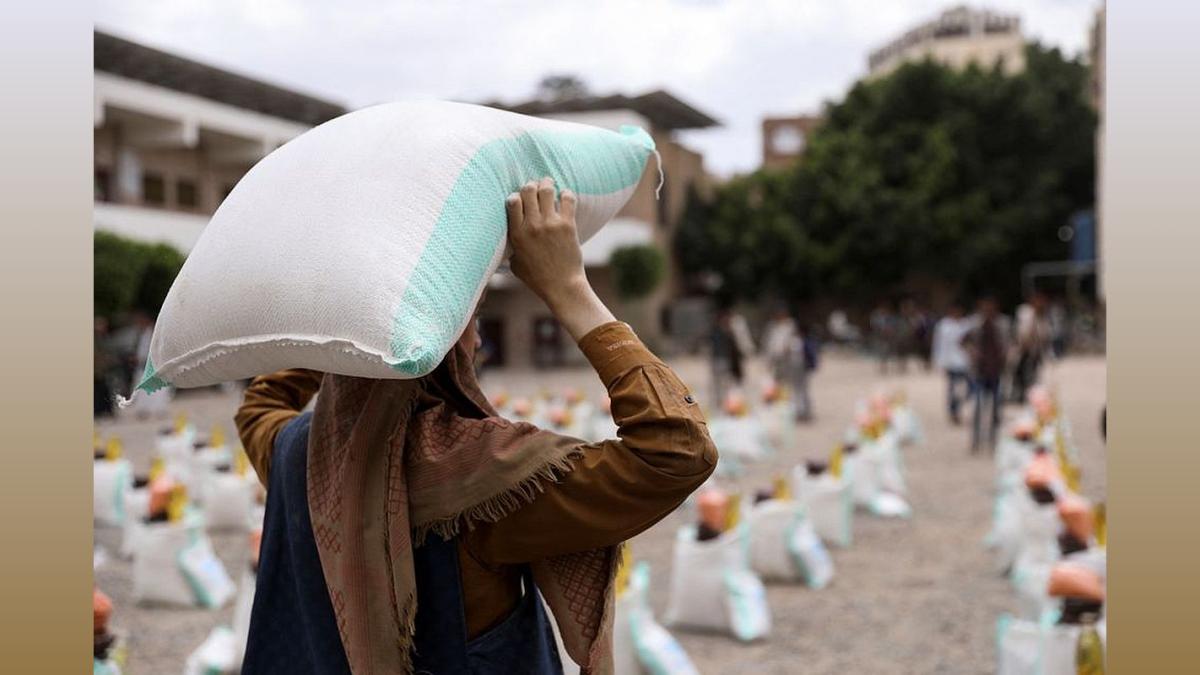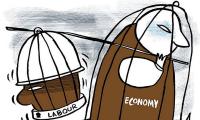WTO Meet: No Breakthrough on Agri, Fisheries Subsidies
WTO members fail to reach an agreement on agriculture and fisheries subsidies at the 13th ministerial conference in Abu Dhabi. Developed and developing countries remain at odds over key issues, including public stockholding and distant water fishing subsidies.

Photograph: Khaled Abdullah/Reuters
Abu Dhabi, Feb 28 (PTI) World Trade Organisation members have not yet managed to make any breakthrough on key issues pertaining to agriculture and fisheries subsidies as both developed and developing countries are tightly holding their positions, an official said on Wednesday.
"There is no change in the stance in the last 24 hours on these two issues," the official said.
Developing countries, including India, are pushing to find a permanent solution to the issue of public stockholding for food security purposes, however, developed nations have not yet shown any interest in that.
Similarly, emerging economies are demanding that at least a 25-year moratorium on subsidies should be there for nations engaged in distant water fishing or fishing-related activities beyond their EEZs (exclusive economic zones).
Fishing beyond 200 nautical miles from the seashores of a country is termed distant water fishing.
India has stressed that historically, while subsidies by certain nations to the fisheries sector have led to over-exploitation, subsidies are also vital for developing countries and small economies to develop and diversify their fisheries sector as well as to protect the food security and livelihood security of their fishermen.
Both issues are being discussed at the 13th ministerial conference (MC) here.
Countries like Norway, China, Japan and the US undertake distant water fishing and provide huge subsidies to their fishing community.
India has called on WTO members to find a permanent solution to the long-pending public food stockpile issue, saying it is directly related to achieving the sustainable development goal of zero hunger by 2030.
This continues to be a long-pending issue for the last few decades despite having a clear mandate agreed by the members in the past.
The PSH programme is a policy tool under which the government procures crops like rice and wheat from farmers at the minimum support price (MSP) and stores and distributes foodgrain to the poor.
Under the global trade norms, a WTO member country's food subsidy bill should not breach the limit of 10 per cent of the value of production based on the reference price of 1986-88.
India has been seeking amendments to the formula for calculating the food subsidy cap.
As an interim measure, the WTO members at the Bali ministerial meeting in December 2013 had agreed to put in place a mechanism popularly called the Peace Clause and committed to negotiating an agreement for a permanent solution.
Under the Peace Clause, WTO members agreed to refrain from challenging any breach of the prescribed ceiling by a developing nation at the dispute settlement forum of the WTO. This clause will be there till a permanent solution is found to the food stockpiling issue.
Further, the official said that India has also opposed any further extension of the moratorium on e-commerce trade.
"There is no change in the stance in the last 24 hours on these two issues," the official said.
Developing countries, including India, are pushing to find a permanent solution to the issue of public stockholding for food security purposes, however, developed nations have not yet shown any interest in that.
Similarly, emerging economies are demanding that at least a 25-year moratorium on subsidies should be there for nations engaged in distant water fishing or fishing-related activities beyond their EEZs (exclusive economic zones).
Fishing beyond 200 nautical miles from the seashores of a country is termed distant water fishing.
India has stressed that historically, while subsidies by certain nations to the fisheries sector have led to over-exploitation, subsidies are also vital for developing countries and small economies to develop and diversify their fisheries sector as well as to protect the food security and livelihood security of their fishermen.
Both issues are being discussed at the 13th ministerial conference (MC) here.
Countries like Norway, China, Japan and the US undertake distant water fishing and provide huge subsidies to their fishing community.
India has called on WTO members to find a permanent solution to the long-pending public food stockpile issue, saying it is directly related to achieving the sustainable development goal of zero hunger by 2030.
This continues to be a long-pending issue for the last few decades despite having a clear mandate agreed by the members in the past.
The PSH programme is a policy tool under which the government procures crops like rice and wheat from farmers at the minimum support price (MSP) and stores and distributes foodgrain to the poor.
Under the global trade norms, a WTO member country's food subsidy bill should not breach the limit of 10 per cent of the value of production based on the reference price of 1986-88.
India has been seeking amendments to the formula for calculating the food subsidy cap.
As an interim measure, the WTO members at the Bali ministerial meeting in December 2013 had agreed to put in place a mechanism popularly called the Peace Clause and committed to negotiating an agreement for a permanent solution.
Under the Peace Clause, WTO members agreed to refrain from challenging any breach of the prescribed ceiling by a developing nation at the dispute settlement forum of the WTO. This clause will be there till a permanent solution is found to the food stockpiling issue.
Further, the official said that India has also opposed any further extension of the moratorium on e-commerce trade.
You May Like To Read
TODAY'S MOST TRADED COMPANIES
- Company Name
- Price
- Volume
- Vodafone-Idea-L
- 11.70 (+ 0.43)
- 33797239
- Spright-Agro
- 0.77 ( -4.94)
- 14959176
- Mehai-Technology
- 1.65 ( -4.62)
- 9665319
- Harshil-Agrotech
- 0.59 ( -3.28)
- 9600535
- AvanceTechnologies
- 1.06 ( -4.50)
- 6710631





